Diplomatic Bluebook 2022
Chapter 4
Japan's Diplomacy Open to the Public
2 Japanese Continuing Working in the International Community
(1) Japanese Continuing Working in International Organizations
International organizations are founded to serve the common interest of the international community. People of various nationalities join these international organizations, and draw on their skills and traits to create an environment where people of the world can live in peace and enjoy prosperity. There are many international organizations working to solve global issues that cannot be addressed by individual countries, including the global pandemic of COVID-19, the environment, climate change, sustainable development, disarmament/non-proliferation, conflict prevention/peacebuilding, food, energy, disaster prevention, education, labor, human rights/humanitarian issues and gender equality.
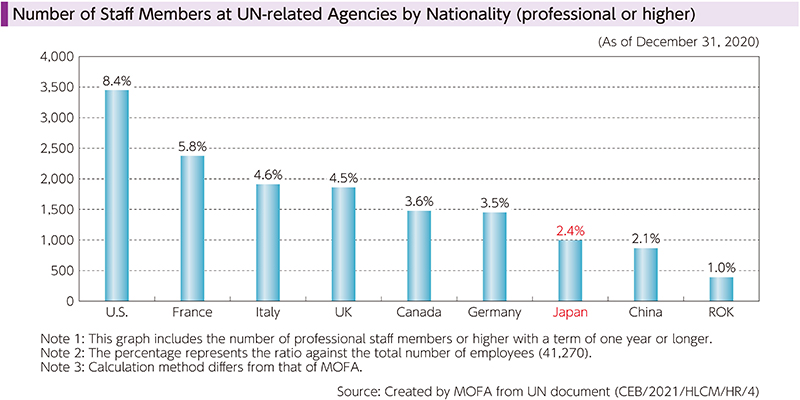
Talented individuals with specialized knowledge, passion and capabilities to contribute to the world's interests are needed so that international organizations can competently perform their duties and fulfill the roles expected of them. As a member country of these international organizations, Japan, in addition to policy contributions, makes assessed and voluntary contributions. Furthermore, it can be said that the activities and services of Japanese staff are, in a broad sense, also Japan's contributions. Additionally, a larger number of talented Japanese people continuing working in international organizations will further enhance Japan's presence in the international community more visibly. Japanese staff are involved in various fields and duties at different locations, but they share the same goal of solving various issues facing the international community (see the Columns on pages 341 and 342). Moreover, encouraging the employment of more Japanese nationals who have professional experience at international organizations and who can continue working in the international stage will in turn lead to enrichment of the human resources of Japan, contributing to the development of Japan as a whole.
Currently, Japanese nationals are serving in important posts at international organizations including the UN. Japanese nationals are actively performing leadership roles at organizations such as the Universal Postal Union (UPU), a specialized agency of the UN that Metoki Masahiko was appointed to head in August, the World Customs Organization (WCO), and Asian Development Bank (ADB) (see the Special Feature on page 344). In addition, for many years Japan has sent a succession of Japanese judges to international courts such as the International Court of Justice (ICJ), the International Tribunal for the Law of the Sea (ITLOS) and the International Criminal Court (ICC). In light of the importance of international organizations for addressing global challenges, securing important posts that contribute to strengthening ties between Japan and international organizations, including as the heads of international organizations, is an important challenge. On the other hand, important posts, including as heads of international organizations, are not something that can be secured overnight. It is necessary to make a finely-tuned response by adopting a long-term perspective while cultivating appropriate personnel.
Currently, 918 Japanese nationals (as of the end of 2020; figures gathered by MOFA) are working as professional-level or higher-level staff in UN-related agencies around the world, which is a record figure. With the aim of further increasing such Japanese personnel, the Government of Japan has set a target of 1,000 Japanese working for UN-related agencies by 2025. To this end, in collaboration with universities, related ministries and agencies, and organizations, MOFA is actively recruiting, training and supporting Japanese nationals who can continue working in the international organizations and make a contribution on the global stage. As part of this effort, MOFA runs Junior Professional Officer (JPO) Programme that sends young Japanese nationals to positions in international organizations for a term of two years in principle with the aim of gaining regular staff positions in such organizations after the term. MOFA also runs a program to support the advance of Japanese nationals who can be future managerial candidates by offering them mid-career and higher professional experience. In addition to encouraging the employment of more Japanese nationals through these efforts, MOFA is also working to coordinate with international organizations and gather information for the employment and promotion of Japanese staff.
MOFA provides useful and timely information such as vacancy announcements to Japanese candidates seeking positions at international organizations through the website for MOFA's Recruitment Center for International Organizations, mailing lists, social media such as Facebook, Twitter, LinkedIn, and video streaming, and provides support related to application procedures for such positions. Public relations efforts include holding guidance seminars to enhance the attractiveness of working at international organizations and to deliver methods to apply for a job, and holding recruitment seminars online featuring senior officials or human resource experts from international organizations.
MOFA will continue to encourage the employment of more Japanese nationals working in international organizations and support their promotion, so that a larger number of competent Japanese nationals who have high aspirations and passion to contribute to solving global issues can take part in international organizations.
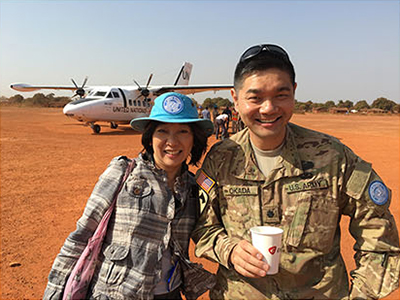 With Captain Martin Okada of the UN Military Observer Group (Central African Republic; author is shown on the left)
With Captain Martin Okada of the UN Military Observer Group (Central African Republic; author is shown on the left)In the run-up to elections in Central African Republic in 2015, MINUSCA,(Note) the UN peacekeeping operation in the country, was concerned about the threat of violence. After all, some six weeks prior, there had been an attempted coup d'état, and for several weeks most UN staff were confined to their accommodation. Those who needed to be present in the Headquarters were transported there by armored vehicle, wearing personal protective equipment (PPE - helmets and bullet proof vests). Every leader of a political party believed he (they were all men) would take over from the interim government, so there was concern that if even one of them thought they might lose, they would readily destabilize the process.
In light of that, the Political Affairs Division where I was serving as deputy director sought to mitigate the potential for electoral violence by building capacity: holding seminars on the democratic process and election campaign techniques. We developed a code of conduct for heads of political parties, which was launched with media coverage and a public signing ceremony. Thanks to the combined efforts of the MINUSCA military, the police, and civilian components, the elections took place without major incident.
The appointment to MINUSCA was my 12th assignment since I began working for the United Nations in 1994, having been recruited through the National Competitive Recruitment Exam (now known as the Young Professionals Programme). It was my sixth country of residence. At that point, I had had the opportunity to work in the fields of politics, human resources, human rights, public relations and development.
Following MINUSCA, I moved to Nairobi with UN-Habitat, and in 2019 I was appointed as Director of UNESCO's Bureau of Human Resources Management. In that capacity, I am often asked for advice on the ideal profile for a successful UN career. As my colleagues working at the UN should undoubtedly know, there is no single answer. However, in my opinion probably the most important experience is to work both at the headquarters and in the field. Many staff who start working in New York, Geneva, Paris, Bangkok or other cities stay there until they reach retirement, and their careers come to an end without having had the chance to live among the beneficiaries the UN is entrusted with serving. The UN places an emphasis on diversity, and at the same time, the ability to encourage people to work together as one based on a common purpose is extremely important in order to perform effectively in the UN.
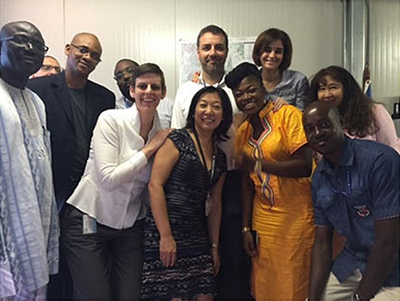 With members of the MINUSCA government affairs bureau (Central African Republic; author is shown in the center of the front row)
With members of the MINUSCA government affairs bureau (Central African Republic; author is shown in the center of the front row)Japanese are particularly suited to working at organizations like the UN. From the time we first enter school, we are taught the importance of having a shared culture and of tackling problems using a common approach. This is an important mindset at the UN, where along with an emphasis on diversity, unity of purpose is likewise viewed as important for our work to have an impact. Furthermore, Japanese people are also blessed with the good fortune of being citizens of a UN Member State that actively contributes to the international community both financially and in terms of programs.
In addition to this advantage, the ability to work in both English and French was one essential skill that awarded me greater opportunities. Language ability is important, and gives UN staff the flexibility to be considered for a wider range of positions, particularly as they become more senior. At UNESCO, which is headquartered in Paris, it is assumed that staff in management roles will have the ability to understand a minimum level of French, at the very least. Being Japanese and being able to work in another UN language is beneficial not just to our own careers, but also to UNESCO, which seeks diversity of its staff but where French language ability remains necessary.
The past 27 years have gone by in an instant. Some of my jobs have been difficult, others, less so. However, one thing has not changed in all the time since I began working at the UN: no other work brings as many challenges, or awards you so many opportunities. And amid that, I believe many of the experiences that have been the most fulfilling and have also proven useful in terms of career development have been the varied experiences centered on the front lines, such as the work with MINUSCA.
- Note United Nations Multidimensional Integrated Stabilization Mission in the Central African Republic
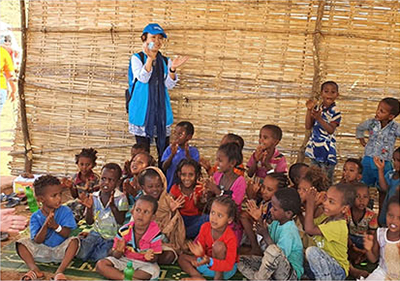 With Ethiopian refugee children at a refugee camp in East Sudan
With Ethiopian refugee children at a refugee camp in East Sudan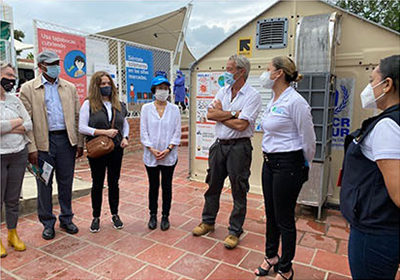 The author (center) receiving a briefing from a partner organization at the Refugee Reception Center in Cúcuta, Colombia
The author (center) receiving a briefing from a partner organization at the Refugee Reception Center in Cúcuta, ColombiaI was assigned to the Office of the United Nations High Commissioner for Refugees (UNHCR) in Mexico in 1991 under the auspices of the JPO program, which is administered by MOFA's Recruitment Center for International Organizations. Since then, I have worked in various UNHCR offices including the Executive Office of the High Commissioner, UNHCR offices in Moscow, Kabul, Iraq, the Regional Bureau for the Middle East and North Africa, and the Global Service Centre in Budapest. In 2020, I assumed my current function as the Director of the Division of Emergency, Security and Supply based at the UNHCR Headquarters in Geneva.
As a frontline humanitarian organization of the United Nations, UNHCR currently protects as many as 82.4 million refugees and other forcibly displaced persons, and assists them until they find a sustainable solution. As the number of refugees in the world continues to soar, my main tasks are to oversee UNHCR's emergency response, support all aspects of supply deliveries including critical relief items, and ensure the safety of UNHCR staff around the world, especially those in remote and high-risk field locations.
UNHCR's emergency response system, which focuses on effectiveness and predictability, was developed in the early 1990s by the former UN High Commissioner for Refugees Ms. Ogata Sadako. Since then, UNHCR has maintained a robust emergency response mechanism, including a roster system where some 150 trained staff are on call for deployment within 72 hours at any given time during the year. In 2021 alone, close to 300 staff were deployed in countries such as Sudan, Ethiopia, Afghanistan, and Colombia, among others. It is worth noting that even though the choice of joining the roster system is voluntary, we receive an overwhelming number of applications every year from motivated staff around the world who are ready to support UNHCR's emergency operations. Such individual willingness and readiness maintain the UNHCR's operational responsiveness to new humanitarian crises.
During my field missions, I saw first-hand the hard work and dedication of our emergency response teams, often working under extremely harsh security and hygiene conditions. My work is to ensure that our personnel are trained and deployed rapidly and, once on the ground, are able to deliver support as effectively and safely as possible.
UNHCR's core relief supplies are strategically stockpiled in seven global warehouses, which have the capacity to respond to 600,000 people at any given time. In 2021, these relief items were emergency airlifted to Afghanistan, Yemen, Sudan, and other countries, providing vital lifelines to refugees and other forcibly displaced persons.
As the world is increasingly conscious of environmental issues, we have recently started to explore how our humanitarian assistance can also be more sustainable and environmentally friendly. As part of the multi-year strategy, and based on the studies conducted on the environmental impact of humanitarian relief items, UNHCR will gradually replace its current relief items with greener ones that can reduce its greenhouse gas emissions. It is hoped that through this new initiative, we can also make UNHCR's future emergency response measures more environmentally friendly.
Working for UNHCR has been a rewarding experience. Through my work with refugees, I have seen the challenges of forced displacement and its devastating consequences. At the same time, I also frequently witnessed the resilience of refugees in overcoming difficulties and trying to build new lives from scratch. These were truly humbling moments. Like the majority of staff in the organization, I learned through field operations. In my current function as the Director of the Division of Emergency, Security and Supply, I remain “field-first,” and will continue supporting my colleagues working in the frontline operations.
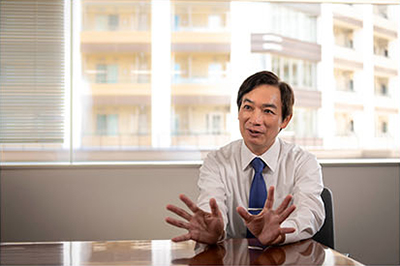 Metoki Masahiko (Photo: Japan Post)
Metoki Masahiko (Photo: Japan Post)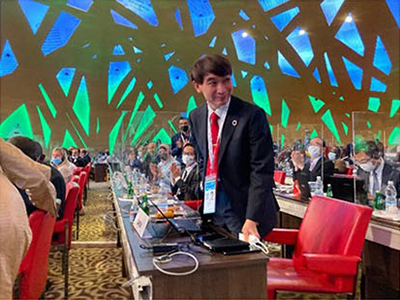 The moment when Metoki was elected (August 25, Abidjan, Côte d'Ivoire. Photo: Japan Post)
The moment when Metoki was elected (August 25, Abidjan, Côte d'Ivoire. Photo: Japan Post)The Universal Postal Union (UPU) (Headquarters: Bern, Switzerland), established in 1874, is one of the world's oldest international organizations. Its role is to formulate rules on international postal services.
To ensure that postal items can be sent and received securely, reliably, and quickly everywhere in the world, it is necessary to develop an international postal network based on fair rules that are applied universally across the world. Particularly under the current COVID-19 pandemic situation, it is becoming increasingly important to have an international postal network that transports daily necessities and supports the global supply-chain. It is vital for the world to improve global postal services and further develop the international postal network through international cooperation within the UPU.
Japan became a member of the UPU in 1877, soon after postal services commenced in Japan in 1871. Japan is one of the biggest contributors to the UPU, and has for many years contributed through various aspects such as funding, personnel, and policies. Meanwhile, Japan has for several years faced the situation of having no top posts in the specialized agencies of the United Nations. That was exactly the time when Mr. Metoki Masahiko, one of Japan's leading experts in the postal field, came forward as a candidate for the Director General of the International Bureau of the UPU, with a view to further strengthening Japan's presence in the international arena of rulemaking through active contribution to the UPU, which harnesses the world-leading expertise of Japan in postal systems and services.
Mr. Metoki has a wide breadth of knowledge in both the postal and diplomacy fields, and has for many years demonstrated his problem-solving and coordination capabilities as the Chair of the Postal Operations Council of the UPU. His achievements have been highly appraised by each country. As a result, in the election of the Director General held in August 2021, he was elected from among three candidates with overwhelming support, and assumed office as the new Director General in January 2022.
Director General Metoki has upheld the following four key concepts toward the reform of the UPU, aimed at responding to a new era of rapid digitalization and maximizing the potential of the postal network: (1) Pioneering new business opportunities in the postal sector; (2) Contributing to the SDGs; (3) Ensuring transparency in decision-making; and, (4) Dialogues with member states and other international organizations. In international organizations, such as the UPU, the respective member states have different interests, so it is not an easy task to advance reforms and establish new rules. With that in mind, Director General Metoki has set out the initiative to encourage member states to be engaged in mutual dialogue.
Under the leadership of Director General Metoki, whose vision is backed by his extensive experience, Japan will continue to contribute proactively to the UPU's activities through applying Japan's experience, skills, and human resources in this field to steadily advance the formulation of new rules on international postal services.
(2) Activities of Non-Governmental Organizations (NGOs)
A Development Cooperation
In the interest of leveraging the capabilities of organizations outside of the Government of Japan to conduct all-Japan diplomacy, the role that NGOs play in development cooperation and humanitarian assistance is expanding significantly. Nowadays, Japanese NGOs provide support to various nations, including developing countries.
Through NGOs, MOFA actively provides Official Development Assistance (ODA) via financial cooperation in the form of grant assistance (Grant Assistance for Japanese NGO Projects) for economic and social development projects implemented by Japanese NGOs in developing countries and regions. The projects cover a wide range of assistance, including health, medical and hygienic care (maternal and child health, countermeasures for tuberculosis, water/hygiene, etc.), rural development (improvement for agricultural environment/technology), support for people with disabilities (vocational training/job seeking assistance, etc.), education (building schools, etc.), disaster risk reduction, and the clearance of landmines and unexploded ordnances (UXO). In FY2020, MOFA provided funding for 109 projects to Japanese NGOs (59 organizations) implementing Grant Assistance for Japanese NGO Projects in 34 countries and one region, including Asia, Africa, the Middle East, and Central and South America (see the Column on page 347). Moreover, the NGO Project Subsidies are provided to improve the project execution capabilities and expertise of NGOs and to support activities that contribute to the promotion of NGO projects.
Additionally, Japan Platform (JPF) was established in 2000 with the aim of conducting emergency humanitarian assistance more effectively and promptly through cooperation and partnerships among the Government, NGOs, and business communities at the time of large-scale natural disasters or conflicts. As of the end of December 2021, 43 NGOs are members of JPF. In 2021, JPF launched Emergency Response to Locust Crisis in South Asia and Africa, Emergency Response to Cyclone Eloise in Mozambique, Emergency Response to Ethiopia Conflict, Emergency Response to Cox's Bazar Refugee Camp Fire, Emergency Response to Tropical Cyclone Seroja in Indonesia and Timor-Leste, Emergency Response to Sandstorms in Mongolia, Emergency Response to Delta Variant of COVID-19, Emergency Response for the Humanitarian Crisis in Gaza, Emergency Response to the Haiti Earthquake 2021, Humanitarian Response to Northern Mozambique Conflict, as well as implemented response programs for humanitarian crises in Bangladesh, South Sudan and their neighboring countries, and Uganda, Yemen, Venezuela, Afghanistan, Iraq, Syria and their neighboring countries.
In this way, NGOs assume important roles in the area of development cooperation and humanitarian assistance. Identifying such NGOs as partners in international cooperation, MOFA and the Japan International Cooperation Agency (JICA) provide indirect support for NGO activities through various policy measures aimed at enhancing their capability and expertise as well as developing human resources so that NGOs can strengthen the foundation for their activities and perform further tasks. In 2021, MOFA implemented four programs – namely, the “NGO Consultant Scheme,” “NGO Study Program,” “NGO Intern Program” and “NGO Study Group.”
The regular schedule for the NGO-MOFA Regular Consultation Meeting, the purpose of which is to promote dialogue and coordination between NGOs and MOFA, was amended due to the impact of the spread of COVID-19, and an ad hoc meeting of the ODA Policy Council, where opinions are exchanged on general ODA policies, was held online in March, and the first meeting of the Partnership Promotion Committee to discuss support and cooperation measures for NGOs was held online in August. In addition, given that achieving the Sustainable Development Goals (SDGs) will require the coordination of all stakeholders, from September 2016, MOFA has been exchanging views with various stakeholders, including NGOs, at the SDGs Promotion Roundtable. Japan's Voluntary National Review (VNR), which was announced at the High-Level Political Forum (HLPF) held in July 2021, was prepared based in part on the views of civil society, and it also included a progress assessment by private-sector members of the Promotion Roundtable. Furthermore, MOFA also partnered with civil society to hold side events at the HLPF.
Moreover, from October 6, 2020, to March 31, 2021, the EARTH CAMP online campaign was co-hosted by MOFA, JICA and the Japan NGO Center for International Cooperation (JANIC), as a substitute for Global Festa JAPAN, which was cancelled due to the impact of COVID-19.
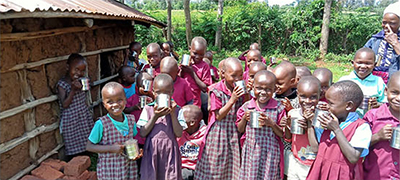 Children drinking maize and cereal in a nutrition improvement project in Kenya
Children drinking maize and cereal in a nutrition improvement project in Kenya(Photo: HANDS (specified non-profit corporation))
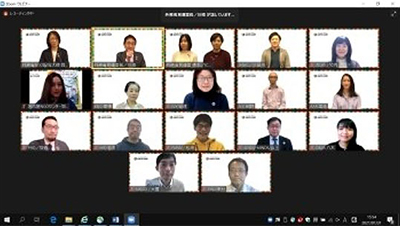 NGO consultants taking part in a panel discussion held for EARTH CAMP
NGO consultants taking part in a panel discussion held for EARTH CAMPB Partnership in Other Major Diplomatic Areas
The Government of Japan has also initiated dialogues with civil society including NGO representatives and experts on matters related to government reports to be submitted based on various conventions on human rights, as well as the National Action Plan on Business and Human Rights, the National Action Plan to End Violence Against Children and the National Action Plan on Women, Peace and Security, which is based on the UN Security Council (UNSC) resolution 1325 and related resolutions. These dialogues also cover the implementation of those documents.
In the area of conventional weapons, MOFA works in cooperation with NGOs in implementing clearance of mines and UXOs, and mine risk education projects, in countries affected by mines and UXOs.
Furthermore, in the area of nuclear disarmament, MOFA has been conducting dialogues with various NGOs and experts. The Government supports the activities of NGOs and others to convey atomic bomb survivors' testimonies regarding the realities of the devastation caused by the use of nuclear weapons to the international community, through the commissioned projects known as the “Special Communicator for a World without Nuclear Weapons” and the “Youth Communicator for a World without Nuclear Weapons.” As of December 2021, a total of 299 Special Communicators on 101 occasions and a total of 483 Youth Communicators on 37 occasions have been dispatched to the world through these commission programs.
With regard to countermeasures to combat transnational organized crime, coordination with civil society, such as NGOs, is essential, especially in the field of trafficking in persons. With this respect, the Government actively exchanges opinions with NGOs and other stakeholders to identify recent trends of trafficking in persons and to examine effective measures to address this crime.
(3) Japan Overseas Cooperation Volunteers, Experts and Others
The Japan Overseas Cooperation Volunteers (JOCV, JICA Volunteer Program) is JICA's program aimed at cooperation and assistance for the socio-economic development of the communities of developing countries, whereby Japanese nationals from 20 to 69 years of age with skills, knowledge, and experience live and work together with local people in these countries while fostering mutual understanding with these people. As of the end of March 2021, 54,428 JOCVs have been dispatched to 98 countries in total since the program's launch in 1965. The dispatched volunteers have been engaged in about 190 types of work in nine sectors: planning/administration, commerce/tourism, public utility works, human resources, agriculture/forestry/fishery, health/medical care, mining, social welfare and energy.
Ex-volunteers have been contributing to Japanese society through initiatives such as sharing their experiences in educational, regional and business activities. These unique participatory initiatives by Japan have been highly appreciated and expected both within and outside of Japan, including recipient countries.
Since November 2020, JOCVs have been redeployed to the countries where the conditions for deployment had been met, while the COVID-19 situation and other factors have been considered (See the Column on page 348). Some volunteers awaiting deployment opportunities are engaging in activities that contribute to resolving challenges faced by regions in Japan. In doing so, they are endeavoring to obtain practical experience and knowledge required for their activities in the countries to which they will be dispatched, and participating in social contribution activities in Japan.
JICA experts with specialized knowledge, insights, skills, and experience are dispatched to governmental agencies and other sites in developing countries. The experts provide high-level policy advice and transfer necessary skills and knowledge to government officials and engineers. Furthermore, they work together with their counterparts to develop, promote and disseminate technologies and systems that are suitable to each country's context. The experts aim to enhance comprehensively the capacity of developing countries so that people in these countries can tackle their development challenges by themselves. The experts engage in their activities while considering elements of each developing country such as its regional characteristics, its historical background and its language. In addition, the experts actively engage in a wide range of sectors, including those addressing basic human needs such as health/medical care and water/sanitation, and those of socio-economic development such as legal system development and urban planning. The experts contribute to the social and economic development of developing countries and to fostering mutual trust between Japan and developing countries through their activities.
In FY2020, due to the impact of the global spread of COVID-19, only 553 experts were newly dispatched, and only 86 countries/regions were covered by their activities. Experts who are on standby in Japan due to the difficulties in traveling to their destination are carrying out their duties while staying in touch with their counterparts remotely.
The Democratic Republic of Timor-Leste is located in the eastern half of Timor, a small island north of Australia and east of Indonesia. After more than 400 years under Portuguese colonial rule and 24 years under the rule of the Indonesian military, it attained independence in 2002, being the youngest country in Asia.
Since Timor-Leste attained independence, the death rate of children under five fell from 126 per 1,000 children to 64 per 1,000 children in ten years, thanks to the strong efforts of the health sector. On the other hand, more than half of the children under five suffer from maldevelopment, while every two in five women from the ages of 14 to 60 suffer from anemia. Hence, efforts to improve nutrition remains an important issue in Timor-Leste as its economy continues to develop.
The dietary habit in Timor-Leste tends to be concentrated on the intake of carbohydrates such as rice, corn, and potatoes. The rural areas in particular suffer from a severe lack of proteins, fats, and other nutrients. Timor-Leste is an agricultural country, with more than 70% of the population living in farming and fishing villages. While agriculture, forestry and fishing, along with tourism, are the pillars of the country's development, the current agricultural, forestry and fishery industries are primarily for self-sustenance and a domestic distribution network for agricultural and marine products has not been developed. Despite being an island state, the annual consumption of fish is 2.7 kg per capita on average (6 kg per capita if imports were included). This is an extremely low figure compared with the global average of 18 kg per capita.
Since 2002, PARCIC has been working to improve the livelihoods of those living in the rural areas by processing and distributing agricultural products harvested in various parts of Timor-Leste. Applying this experience, we came up with the idea of working with Timor-Leste's largest fishery association on Atauro Island in Dili, as well as its women's groups, to produce Japanese “furikake,” rice seasoning, by utilizing, for example, local fish and Moringa leaves, and introduce them into the general market and school meals and expand the production and distribution of “furikake.” By doing so, we aim to revitalize economic activities in fishing villages while contributing to the nutrition issue at the same time. Since 2019, we have been implementing the “Nutrition Improvement Project by Spreading ‘Furikake' and Eating Habits Improvement” upon receiving ODA funds from the Government of Japan under the Grant Assistance for Japanese NGO Projects program.
At our “furikake” production base on Atauro Island, 194 women have participated in training to produce the ingredients for making “furikake.” Women from Atauro Island had the practice of drying and preserving the fish they captured, but the fish was too salty and processed under poor hygiene conditions. So at the training sessions, they learned how to produce the ingredients safely while ensuring the tastiness of the products. Moringa and sesame are familiar produce to the locals, and had previously been used as goat feed. However, having learnt the value of these as ingredients for making “furikake,” the women became very motivated in the cultivation and processing of these ingredients.
The “furikake” produced has been introduced in school meals in the capital city of Dili as well as the mountainous district of Ermera. In parallel with cooking classes for those who are in charge of preparing school meals and nutrition workshops for fourth graders in elementary schools, efforts are ongoing to encourage the local communities to use “furikake” in preparing meals at schools and homes. At the end of each activity, we can sense the strong desire of women in Timor-Leste to provide balanced and nutritious meals to their families. Although efforts have been hampered by unexpected factors due to the impact of the COVID-19 pandemic, such as the mass suspension of school classes and school meals from March 2021, we aim to continue with the activities while sharing with the women that familiar ingredients close to them can also be a source of income and a way of improving nutrition at home.
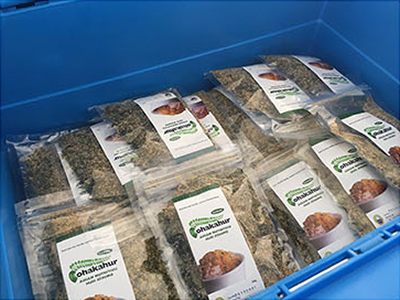 “Furikake” produced in Timor-Leste
“Furikake” produced in Timor-Leste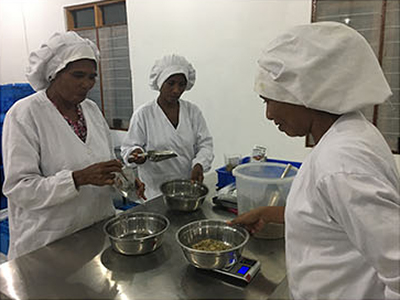 Women of Atauro Island producing “furikake” at the factory
Women of Atauro Island producing “furikake” at the factory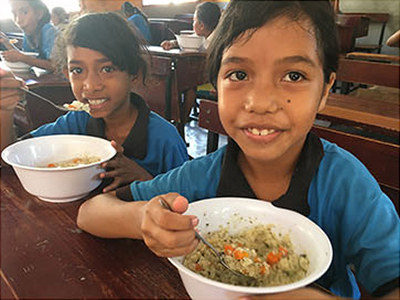 Elementary school students enjoying “furikake” during a school meal
Elementary school students enjoying “furikake” during a school meal“I'm waiting for your return.”
I was sent to Viet Nam on April 9, 2019. However, I returned temporarily to Japan in less than a year due to the COVID-19 pandemic. I departed for Viet Nam again in early December 2020 after waiting in Japan for about eight months. My colleague in Viet Nam said the above mentioned words, and they supported me during my stay in Japan.
I was dispatched to Long An General Hospital in the southern part of Viet Nam to engage in nursing administration of the hospital, at its request. Before my temporary return to Japan, I had been conducting audits for nursing and other activities so that nurses could carry out their duties safely.
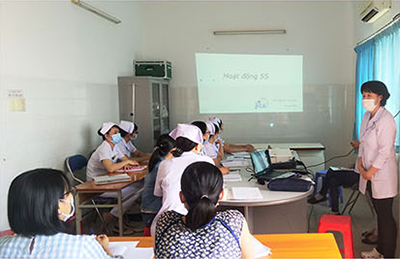 During a “5S” study seminar (author on the right) (January 13, Long An, Viet Nam. Photo: Long An General Hospital)
During a “5S” study seminar (author on the right) (January 13, Long An, Viet Nam. Photo: Long An General Hospital)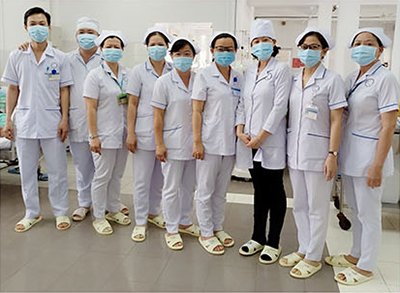 Group photograph at the final audit (the author third from the right) (March 25, Long An, Viet Nam. Photo: Long An General Hospital)
Group photograph at the final audit (the author third from the right) (March 25, Long An, Viet Nam. Photo: Long An General Hospital)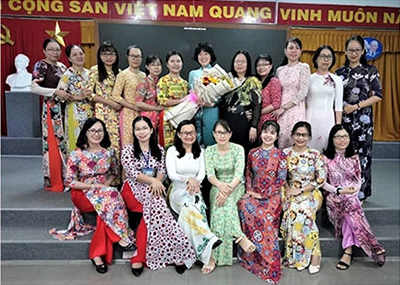 Final activity report at the place of assignment (the author sixth from the right in the back row) (Note) Masks were removed for the photograph. (March 30, Long An, Viet Nam. Photo: Long An General Hospital)
Final activity report at the place of assignment (the author sixth from the right in the back row) (Note) Masks were removed for the photograph. (March 30, Long An, Viet Nam. Photo: Long An General Hospital)At the hospital, nurses were quite busy due to a shortage of nurses and the burden of accounting input work for drugs, etc. There were available manuals for nursing, however the nurses were not quite familiar with it. Therefore, we conducted study seminars on medical safety for all employees, published regular audit reports, and engaged in other activities to address the problem. I had a feeling that I was not fully accepted into the team at the beginning, but they gradually came to trust me as I interacted proactively with them to build up interpersonal relationships.
However, I had to return to Japan just as the activities finally began to get on track. I was encouraged by the messages I received from my colleagues although I felt anxious during my sojourn in Japan. Therefore, I worked hard to prepare materials for the activities.
I wanted to do everything I could and all the more because of the ongoing pandemic after resuming the assignment in Viet Nam. I cooperated with JICA members and other dispatched volunteers to produce a video to raise awareness on infection control. In this video, we incorporated a dance to spread handwashing that I performed with the other members to the tune of the COVID-19 educational song “Ghen Co Vy,” produced through cooperation between a famous Vietnamese artist and the Ministry of Health of Viet Nam. In this way, we raised awareness of infection prevention measures that the Ministry was disseminating(Note). These activities were effective in encouraging employees at my assigned hospital to review the handwashing procedures using the video.
I also focused on the “5S” activities (“sort” (seiri), “set” (seiton), “clean” (seiso), “cleanliness” (seiketsu), and “discipline” (shitsuke)) at Long An General Hospital. I believe keeping a workplace clean is important for infection control as it can prevent bacterial growth. This had not become sufficiently established as a common practice although the “5S” activities had already been introduced to the hospital several years ago. So, I made posters to raise awareness and carried out “5S” activities to keep intravenous procedure trolleys, which nurses use constantly in their work, clean. As the head nurses in each hospital department understood the importance of the “5S” and initiated the implementation of activities, other staff also began to follow suit.
COVID-19 broke out again in Viet Nam after my return. Long An, which neighbors the major city of Ho Chi Minh City, was on high alert. I braced myself and gave my best in all the activities, despite carrying them out in a tense atmosphere.
Some JOCVs went back to their assigned countries, however, many volunteers are still waiting to return to their host countries. I am grateful that I was reposted under these circumstances. I will continue to do my best to utilize my experience gained through my volunteer activities to society. I am thankful to everyone who has supported me in my volunteer works.
- Note: Published on the Facebook page of JICA's Viet Nam office
https://www.facebook.com/watch/?v=872043003611018





